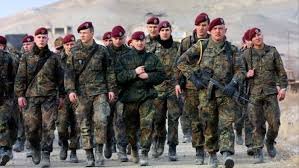Germany, for the first time in its modern history, officially observed Veterans Day on Monday, marking a significant moment of national reflection and dialogue on military service, remembrance, and the country’s complex relationship with its armed forces. But even as the government conducted solemn ceremonies honoring veterans, the day was met with waves of peaceful but passionate protests in several German cities, questioning the implications of glorifying military service in a nation still deeply cautious about militarism.
A Historic First for the Bundesrepublik
In a country where the scars of two world wars still run deep, Germany has long avoided traditional military ceremonies that resemble those of the U.S., U.K., or France. But on June 16, 2025, that changed.
The Bundestag approved the introduction of “Tag der Veteranen” (Veterans Day) last year, aimed at honoring all former members of the Bundeswehr – Germany’s post-war army established in 1955 – as well as those involved in humanitarian missions and international peacekeeping efforts.
At the official event held in Berlin’s historic Bellevue Palace, President Frank-Walter Steinmeier addressed a mixed crowd of veterans, political leaders, and citizens.
“This day is not about glorifying war,” Steinmeier emphasized. “It is about acknowledging the courage, commitment, and sacrifices of those who served this republic under the banner of peace and democracy.”
Chancellor Olaf Scholz, in attendance, echoed these sentiments, highlighting Germany’s evolving global responsibilities. “We must recognize the men and women who wear the uniform not as instruments of war, but as guardians of peace, stability, and international solidarity.”
Peace Marches and Anti-Militarism Demonstrations
Even as official ceremonies unfolded, thousands gathered in Berlin, Hamburg, Leipzig, and Cologne in what organizers described as a “March for Peace and Memory.”
The protests were largely peaceful, led by pacifist groups, student organizations, and human rights activists. Their message was clear: Germany must continue to lead by example in diplomacy, not defense budgets.
One banner in Berlin read: “Never Again War – Honor Peacekeepers, Not Soldiers.”
Katrin Neumann, a 24-year-old university student in Munich, who travelled to the capital for the march, told us:
“My generation is not anti-veteran. We’re just skeptical of how this day could evolve. We want to ensure it doesn’t become a celebration of militarism.”
Meanwhile, some veterans at the official ceremony expressed mixed feelings.
Peter Hagen, a retired Bundeswehr medic who served in Kosovo and Mali, said,
“It’s moving to be recognized. But I understand the concerns. We need to have both remembrance and responsibility.”
A Day of Dialogue, Not Division
Interestingly, public sentiment about the day seems divided but not hostile. According to a recent YouGov poll, 52% of Germans supported the idea of a Veterans Day, while 34% remained opposed or uncertain. Younger citizens, especially between the ages of 18 and 30, were less supportive, citing fears of a creeping normalization of military pride.
But what was noticeable across both the ceremonies and the protests was the tone, not of confrontation, but conversation.
Schools across Germany held special classes about post-WWII military history and Germany’s role in NATO. Public broadcasters aired documentaries on the evolution of the Bundeswehr and Germany’s modern peacekeeping missions. Social media saw a trending hashtag – #VeteransDayDE – filled with stories from veterans and civilians alike, debating what “service” truly means in 21st-century Germany.
What Will Veterans Day Become?
This first Veterans Day could well shape the national memory and future military policy. Analysts point out that Germany is gradually repositioning itself on the international stage, especially with the war in Ukraine and rising defense cooperation within Europe.
Still, many Germans remain vigilant. As historian Dr. Anna Vollmer put it,
“Germany’s strength lies in its ability to remember – not just the service of soldiers, but the horrors of conflict. Veterans Day will only succeed if it keeps both in mind.”
As Germany takes its first step in officially honoring its veterans, it has also opened the door to a broader national debate. One thing is clear: this new day in the calendar is more than a commemoration – it is a call to reckon with history, service, and the meaning of peace.
FOR MORE UPDATES VISIT QUESTEURO

More Stories
Lyft and Baidu Announce Launch of Robotaxi Service in Europe for 2025
Lyft and Baidu Announce Robotaxi Service Launch in Europe for 2025
Lyft and Baidu Announce Launch of Robotaxi Service in Europe for 2025